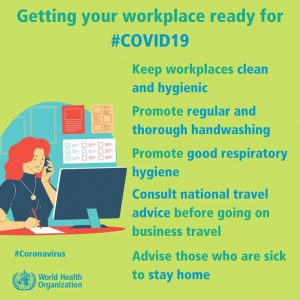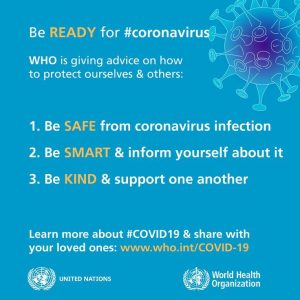Sick leave arising from infections out of COVID-19
- July 30, 2020
- Posted by: wachirawanjiru
- Category: COVID-19

A member of your organization tests positive for COVID-19. The first reaction would be to panic as you worry that the organization has been and that your operations will come now to stand still. However, with proper planning, it is possible to deal with any arising situation out of an infection.
The Ministry of Health has released guidelines on how to protect ourselves at the workplace. This has definitely impacted the parameters of Occupational Safety and Health Act (OSHA). Is this an area that insurance companies are willing to provide cover for? As we are aware, most insurance companies at the start of the pandemic indicated that they would not cover any cost associated and arising out of COVID 19. This means as an employer you need to reassess the terms of your policy with your Insurance Company.
Some of the guidelines that the Ministry of Health has released include providing sanitizers and washing points for employees and any person accessing your workplace. Furthermore, you’re required to wear masks in public gatherings and in this case our workplaces.
Most of these require a personal responsibility on the part of an employee or an employer for that matter.
The basis of this article is to address how an employer should deal with an infection arising out of COVID-19.
At the outset, you need to report the same to the Ministry of Health for further testing of other employees in the organization as you assess whether your critical employees are still able to attend work.
The question that remains is- how do you deal with the individual employee who is currently infected?
COVID-19 is a viral infection, according to the World Health Organization. An illness would therefore fall within the parameters of the Employment Act, 2007.
The Employment Act provides that sick leave shall be granted to an employee for the first seven days on full pay and for the next seven days at half pay. This is the basic minimum that the government envisions.

Several organizations have enhanced this provision through Contracts, Human Resource Policies and in other instances entered into collective bargaining agreements with their employees through their unions where they enhance the basic minimum that is set out in the Employment Act.
We now then look at what would happen in the event of a mandated quarantine for 14 days or 14 days isolation as is the recommended timeline by the Ministry of Health. This begs the question, would this mean then that an employee will have exhausted their days off on sick leave if you are to go strictly by the Provisions of the Employment Act?
The law in this case is clear, an employees entitled 14 days of sick leave. The Judges of the Employment and Labour Relations Court have determined that an employee can proceed on Sick Leave upon providing proof of sickness and can only be terminated upon a medical practitioner giving a report on incapacity to work due to the Sickness.
How then does an employer reconcile the provisions of section 30 with the provisions of section 34 of the Employment Act, which requires an employer to provide medical attention to an employee in the event of a serious illness?
It is definitely prudent to point out that there are exceptions to this provision, in that an employer will not be bound to provide medical attention where the government will provide the same free of charge or treatment as provided under an established insurance scheme that covers an employee.
Has the Kenyan Government been providing free medical care for patients suffering from COVID-19? This is in the public domain and news articles within the country. The government has been charging individuals who are in isolation, and or quarantine and also receiving treatment for COVID -19. This is mandatory isolation which is enforced by the government in within government institutions and or institutions that are specifically identified by the Ministry of Health as isolation centers.
Is it then fair for the Government to expect an individual to undertake to pay their own bills taking into consideration the provisions of Article 43 of the Constitution which provides that every person has the right to the highest attainable standard of health, which includes the right to health care services and access to emergency medical treatment.

The state also has a fundamental duty to observe, respect, protect, promote and fulfill the rights and fundamental freedoms in the Bill of Rights, in this case, the provision of health care services to its citizens.
The state’s intention to renege its responsibility to its citizens is therefore discriminatory and callous.
Taking into consideration the foregoing, the employer would then be responsible to provide medical care for their employees who have been diagnosed with Covid-19. As an employer, are you prepared for this eventuality? Additionally, have you reviewed the Insurance Policies covering your employees under the provisions of OSHA.
Have you done an evaluation of the conditions of work at your workplace to control the spread of disease and illness that may arise out of COVID-19.
Remember that there should be no discrimination of an employee on the basis of their health in this case a positive diagnosis of COVID-19.
Be further advised that we shall not be held liable in the event you rely on the information herein without a further in-depth consultation based on your unique circumstances as the same is a general guideline. Our team at Wachira Wanjiru & Company Advocates continues to be available for any consultations that you may require with regard to arising legal issues. Contact us on info@wachirawanjiru.co.ke or +254720790133 for your business needs.
